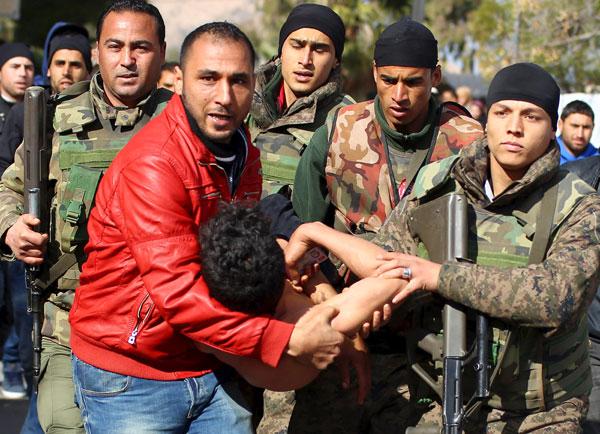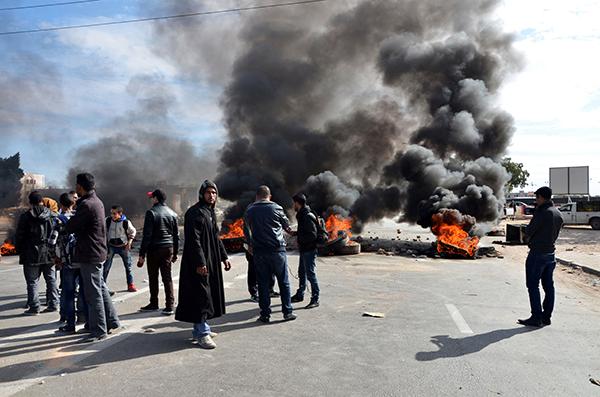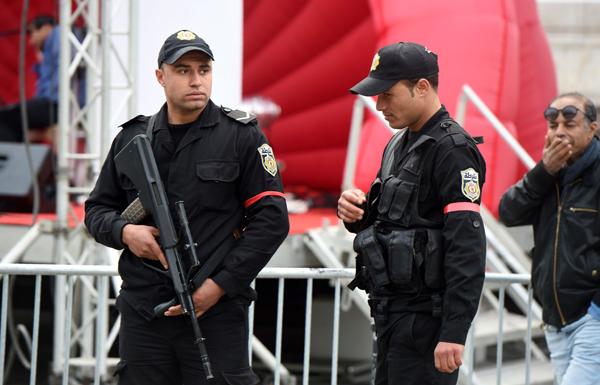You are here
Five years on, unrest tests ‘Arab Spring’ model Tunisia
By Reuters - Jan 24,2016 - Last updated at Jan 24,2016

A citizen and soldiers carry a man who attempted to set himself ablaze in a suicide protest over unemployment outside the local government office in Kasserine, Tunisia, on Friday (Reuters photo)
KASSERINE, Tunisia — On December 17, 2010, a young, desperate Tunisian vendor named Mohamed Bouazizi set himself ablaze in a suicide protest over unemployment and police abuse that spread revolt across the Arab world.
Five years on, Ridha Yahyaoui, another young Tunisian, has killed himself in frustration after being refused a job, inflaming protests through the same impoverished towns that once brought down the regime of Zine Al Abidine Ben Ali.
If Tunisia was hailed as the success story of the Arab Spring revolts for its democratic progress, it has also become an example of the dangers in failing to tackle economic malaise, alienation and frustrations of North African youth.
In Kasserine, the impoverished central city where this week's protests began, more disaffected young men have threatened to kill themselves. Two were injured after trying to throw themselves off the roof of the local government building in fits of anger over the lack of jobs.
The unrest has quickly spread to other towns in the north and south of the country, and shows no signs of weakening — protesters have stormed police stations and local government offices and killed one policeman. Tunis has been mostly calm, but sporadic rioting hit two poor districts on Thursday night.
Chanting “Work, freedom, dignity”, protesters have been quick to evoke the 2011 “Jasmine Revolution” and echo demands over its promises of political freedom and the economic opportunities they say have failed to materialise.
Many protesters are already blaming the nonchalance of former Ben Ali regime officials like President Beji Caid Essebsi, who have returned to power even after the revolution forced the autocrat himself to flee the country into exile.
“I thought the revolution would give us hope to find work with dignity,” said Haamza Hizi, 28, an unemployed man in Kasserine. “I never thought I would repeat the same demands five years ago. The old regime has robbed our dreams.”
Tunisia managed mostly to escape the kind of violent after-shocks seen in other “Arab Spring” countries that toppled long-standing leaders in Egypt, Yemen and Libya, which are still struggling to find stability.
Its young democracy brought a new constitution, a political compromise between secular and Islamist parties, and free elections praised as a model for transition in a region where the gun has often beats out the ballot box.
But political progress has not been matched by economic advances. Unemployment stood at 15.3 per cent in 2015, up from 12 per cent in 2010, due to weak growth and lower investment.
University graduates comprise one-third of jobless Tunisians after student numbers increased. Mohamed Bouazizi was a graduate who had to sell fruit and vegetables to survive.
Those conditions are part of why even middle-class, educated Tunisians sometimes fall prey to militant recruiters seeking fighters for their ranks in Syria, Iraq and now Libya. More than 3,000 Tunisians are believed to be fighting in militant groups in Iraq and Syria.
Frustrations are most prevalent in poor urban districts of the capital and in the rural, marginalised communities where this week’s protests erupted.
“Ridha killed himself because he lost hope,” said Yahyaoui’s father Hathmane, clutching a photograph of his son. “I have lost my son, but I warn the authorities, my son will be the new Bouazizi and his death with create more protests for work and dignity.”
Promises, but what next?
Sidi Bouzaid and Kasserine were the first cities to rise up against Ben Ali in the 2011 revolt. Unemployment in the olive and fruit farming region bordering Algeria is almost double the national average.
It has always been a sensitive area. Two years ago, an attempt by the government to trim subsidies by rising vehicle taxes, triggered rioting in Kasserine and one man was killed.
Since the revolution, the region has also been affected by violence linked to Tunisia’s low-intensity conflict with militants, who use the border region with Algeria as a base for their operations, mostly against the army.
President Essebsi on Wednesday announced the government would seek to employ more than 6,000 youth in Kasserine and start construction and development projects. On Thursday, thousands came out to register at the governor’s office.
“We understand well the demands of protesters and they are legitimate,” government spokesman Khaled Chouket said. “But there may be attempts to infiltrate the protests to darken the name of Tunisia and undermine our democracy.”
The unrest comes at a delicate moment for the government.
Unlike its oil-wealthy neighbours Libya and Algeria, Tunisia has few natural resources and the years of instability have crimped investment.
Three major attacks last year by militants — against a museum in Tunis, tourists in a Sousse beach resort and a suicide bombing in the capital — have especially hit the tourist industry, a key source of jobs and revenue.
Across the border, Libya is imploding as two rival factions battle for control after the fall of Muammar Qadhafi, creating a haven for militants and another source of instability.
Essebsi’s ruling Nidaa Tounes Party is also caught in a crisis of its own making. Nidaa has split over a fight about the role of Essebsi’s son in the party and one faction is threatening to break away.
Opposition parties and social movements say the government has ignored regional development projects and let frustrations fester in rural areas.
“There is real anger and tension against the symbols of the state,” Essam Chebbi, of the opposition Republican Party, told Reuters. “That means people don’t have confidence in the government and it has lost credibility.”
Prime Minister Habib Essid has returned early from the World Economic Forum summit in Davos, convening an emergency Cabinet meeting and saying he would address protests on Saturday. But there is little patience in the streets for just promises.
“The government says it has no magic wand,” said unemployed Arabic language graduate Mohamed Klhifi in Kasserine. “But our response is, we don’t want magic, we want our right to a job.”
Related Articles
TUNIS — Tunisian Prime Minister Habib Essid pleaded Saturday for people to be "patient" after a wave of protests against poverty and unemplo
KASSERINE, Tunisia — Fresh protests over unemployment and poverty in central Tunisia on Thursday raised fears of growing social unrest five
TUNIS — Tunisian police fired tear gas on Tuesday to disperse hundreds of angry protesters demanding jobs in the central city of Kasserine,


















